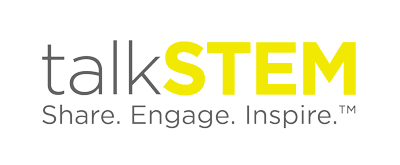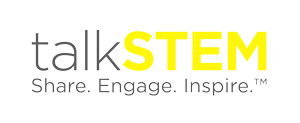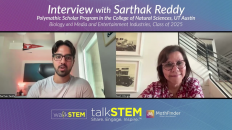

Dr. Gina Cherkowski
We recently had the chance to interview Dr. Cherkowski about the importance of STEM and innovative thinking for today’s students. Dr Cherkowski is founder of Calgary-based STEM Learning Lab which very recently merged with EdgeMakers, and holds a Ph.D. in Mathematics Education as well as in Culture Studies in Education. She is an acclaimed developer of STEM learning programs for teachers and students that have advanced the mission to ensure all students have access to high-quality STEM learning experiences so they are aptly prepared for our technology-driven, dynamic world.
How are STEM and Innovative Thinking Connected?
At EdgeMakers, we are calling for a new definition and standard for STEM education, one that embraces innovative thinking and emotional intelligence combined with hands-on project-based learning opportunities. We call this STEM 2.0. Schools that embrace STEM 2.0 will ensure that students are equipped with the social and emotional tools and mindsets they need to lead the way as learners, leaders, and change-makers in the 4th Industrial Revolution. We know that technology skills are critical, but combine these with innovative thinking tools and emotional skills and capacities and we will have a workforce that will lead the world forward.
How do you think educators in all settings (formal and informal) and for all ages should think about innovation, and why is this capacity critical for students?
New technologies are changing the way we live, work, play and engage with one another. Advanced AI, 3D printing, the Internet of Things, and the availability to be globally connected are disrupting both our formal and informal systems at record speed. In order to move beyond old ideologies that prepared students for yesterday, and even for today, we need to embrace new ideas in order to prepare students for tomorrow.
The ability to leverage new technologies and, more broadly, to adapt, collaborate and innovate to solve complex problems are critical capacities that will be required in order to be successful and contributing citizens in the rapidly approaching 4th Industrial Revolution. Schools, as the primary institutions that prepare our citizenry to be actively engaged critical citizens, have an obligation to prepare students for this mass disruption. Thus, innovative thinking and social and emotional intelligence must gain traction so that humans are at the center of this mass disruption, as opposed to technology being the driver.
Beyond the curriculum you offer, what other ways would you suggest that parents, children, and teachers flex their innovation muscle?
Teachers and parents can look for STEM, STEAM, maker and entrepreneurial summer camps, after-school clubs, and/or weekend or evening workshops to flex their innovation muscles. In schools, adding a maker space or a STEM Lab is a great way for schools to get started. We know that allowing students time and access to play and innovate using new technologies is increasingly important and highly relevant given today’s world. In order to add some robustness and depth to their experience, having a STEM or innovation coach is helpful as teachers may need additional support working with emerging technologies and new ideas.
Why is STEM, and more specifically, math, a social justice issue?
Mathematical knowledge is connected to educational and vocational opportunities and to future earning power, as well as with job satisfaction, community volunteerism and even to social and emotional well-being. This means people with mathematical knowledge are positioned for well-rounded success in today’s and tomorrow’s world, while those who don’t have math skills are at a fundamental disadvantage. Troublingly, disparities in math continue to cut across racial, social and gender lines leaving an inequity regarding “who gets to know” math and can, therefore, enter STEM and other fields. This disparity—and that fact that we can and should be doing more to eliminate it—is the very definition of a social justice issue.
Fortunately, there’s much we can do. For example, I have found that carefully designed, mathematically rigorous STEM learning experiences—like making, coding, robotics, and 3D printing—provide much-needed context, meaning and connection to mathematical ideas for struggling learners. Hands-on experiences both leverage and foster children’s innate spatial skills, which are highly connected to math and STEM. These strategies reach struggling students before they give up on math and get them re-engaged in learning.
The exponentially growing demand for knowledgeable workers in the STEM fields speaks to the economic side of the issue as well as the social side. To prepare students for the jobs of the future, we need to engage all students in math and start early. Research shows that early math skills are a strong predictor of overall future academic success. With a commitment to social justice and equal opportunity for all students, we can resolve to equip and empower every kid with the requisite skills to be an ethically engaged problem-solver and change-maker of tomorrow.
About STEM Learning Lab and EdgeMakers:
In March, EdgeMakers and STEM Learning Lab announced that they have merged, paving the way to provide the curriculum and professional development that empower K-12 educators to deliver the authoritative, integrated approach to teaching the disciplines of the 21st century. The new company known as EdgeMakers combines STEM Learning Lab’s education and professional development programs, which are unmatched in their ability to teach students the essential “hard skills” needed for 21st century success, with EdgeMakers’ groundbreaking innovative thinking curriculum, which helps learners apply their skills toward a true purpose to effect meaningful change. The company offers programs in Maker & STEAM, Robotics & AI Programming, Engineering Design & 3D Printing, Coding & Computational Thinking and Circuitry & Hardware Programming. EdgeMakers’ innovation courses have been offered by schools in Houston and Cypress, Texas, and are state-approved in both Texas and California.
EdgeMakers brings together the work of John Kao and Gina Cherkowski, leading thinkers in innovation and STEM, to create something truly unique in the education marketplace. Known as “Mr. Creativity,” Kao is the founder of San Francisco-based EdgeMakers, and has spent the better part of 30 years creating compelling learning experiences for emerging innovators and entrepreneurs and launched his innovative thinking curriculum during a 15-year tenure as a professor at Harvard Business School. Cherkowski, the founder of Calgary-based STEM Learning Lab, holds a Ph.D. in Mathematics Education as well as in Culture Studies in Education. She is an acclaimed developer of STEM learning programs for teachers and students that have advanced the mission to ensure all students have access to high-quality STEM learning experiences so they are aptly prepared for our technology-driven, dynamic world.







Add comment